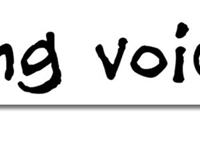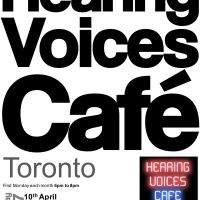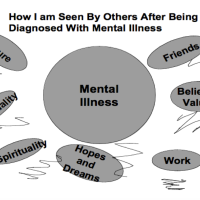[…continued from Reducing the pool of normal]
The Big Book of Woe, soup-in-a-can, psychiatrists as car mechanics and dreaming of white lavender scented sheets…
DSM and inclusion
For all the fuss, at least DSM5 is, unlike its predecessors, inclusive – since its authors worked sooo hard to invents enough disorders so we can all have one and we can all find ourselves a place in it. We need not look too hard to find ourselves featured on at least one of the thousand or so pages of this big book of woe and disorder.
Spend some time with it [and about five minutes is more than enough] and you’ll find it hard not to come away thinking of yourself as something of a trendsetter in mental health – having multiple diagnoses or comorbid disorders, since you likely qualify for at least a handful, if not a few dozen “disorders”.
For this is the nature of the beast – and perhaps a feature of careful design.
Notice, if you will, how…
- the categories of disorder are, by sheer cunning or by sloppiness, overlap such that if you qualify for one disorder you also qualify for a slew of others.
- the list of side effects for the colourful little pills that you are likely to be prescribed for your first disorder will match the list of symptoms for a whole bunch of disorders that you never even realised existed.
Before long you’ll be wondering:
“do I need to get me some more drugs?”
Eventually you’ll realise its just bollocks.
would you like the combo, sir?
Ladeeeez! and Gen-el-men!, Roll up!
It doesn’t come with fries and a coke, neither a donut nor even a doughnut but multiple disorders and it’s ugly twin polypsychopharmatherapy are biomedical psychiatry’s version of that modern marketing phenomena of “upselling” – the combo.
It is no longer good enough to have just one mental disorder. To be truly modern we must be multiply disordered, at-least dually-diagnosed and polypharmacy-ed till we rattle with pills as we waddle and shuffle along the road to our next appointment..
Forget about work: you will need all your time for shuttling between and waiting in waiting rooms for appointments with multiple diagnostical specialists who send each other faxes and letters [why don’t they talk? or email?] arguing about arguing, about about the right diagnosis and golf handicaps, till eventually you get more drugs and they get more money for the fancy new golf clubs that dubious research shows will reduce that golf handicap better than placebo.
ideal patient?
We have become reduced, in this understanding of what it means to be human, not even to machines- but to simple receptacles for chemicals and with a similar capacity to that of a golf bag: 140,000 pills in the average adult lifespan.
No wonder they call us “consumers”.
Along with the simplistic understanding goes the simplest model for a regime of “care”:
- drugs, drugs, drugs, and then more drugs
- if the drugs don’t work, that’s a sure sign we need more drugs – the pink ones, maybe
- if we find taking drugs tricky they shove em in our ass cheek with a gert big needle – a whole depot full of drugs
- and if we miss the scheduled appointment for that they send a court ordered hunting party out to come down on our ass with an even bigger needle – and call that “assertive community care”.
When that breaks down completely they might see what happens when they plug us into the electricity supply. This is all to increase the effectiveness of the drugs, or at least to ensure our compliance with their belief in their drug culture.
A visit to the Doc
When we visit the doc, it goes something like this:
Doc asks:
“how are you doing?”
which both people in the room understand to mean:
“how are the drugs?”
“do we need to give you more drugs?
Then:
“See you next time, don’t forget the drugs.”
Next time try asking if your doc if they have some free samples. They always do.
Sometimes, we visit the doc minded that we will talk about something other than drugs, but, still, we always do come away with more drugs.
check ups, periodic overhauls and spa breaks
 Now and then we might feel the drugs are not working so well and we might book an appointment, walk into or get taken into some service centre – where we are given a fluid change, new filters, tyre rotations and periodic overhaul.
Now and then we might feel the drugs are not working so well and we might book an appointment, walk into or get taken into some service centre – where we are given a fluid change, new filters, tyre rotations and periodic overhaul.
Oops, sorry, that’s the car but it’s actually not that different. Hospitals offer the same standardised package deals: three, ten, 21 day stays from which we emerge, overhauled with a fluid change – spanky new drugs that are “more targeted” with “fewer KNOWN side effects” : the “non-typicals” that, all too typically, in a few years will be revealed to have at least as many and more harmful side effects as the old “typicals”.
Meanwhile new longitudinal studies [medical research that lasts longer than six weeks] will in time reveal that you’d likely have done better on fewer drugs, or no drugs, or if you lived in a developing country where there is no access to the drugs you’ve been taking these last few years.
 These centres now even advetrtise their overhaul packages as if they were spa breaks and target them to those situations in which you are at your most vulnerable. Find them at transit shelters where you can be subliminally tempted, hypnotised even, into dreaming of clean white sheets as you wait, late and anxious to get to that sucky job with the suckier boss that is slowly grinding you to existential dust and driving you nuts.
These centres now even advetrtise their overhaul packages as if they were spa breaks and target them to those situations in which you are at your most vulnerable. Find them at transit shelters where you can be subliminally tempted, hypnotised even, into dreaming of clean white sheets as you wait, late and anxious to get to that sucky job with the suckier boss that is slowly grinding you to existential dust and driving you nuts.
Doctors’ – and by extension other “healthcare” workers’ – role has now been reduced to that of mechanic: they no longer treat the person in front of them but the diagnosis – or more likely the collection of diagnoses.
Once that diagnosis or collection pops up next to our name on the screen in front of them, it also pops up the “gold standard” model of treatment: a list of drugs and woe betide if they fail to comply.
Intended or unintended, by reducing us to non-human Doctors have also reduced themselves: role of the modern doctor can be seen as essentially a combination of a mechanic on piecework, and a drug salesman on a fat commission. The job sucks most of the time but the money and perks rock their world so they soldier on. bless em.
pic:
A car doctor diagnoses your car’s brain disorder.
-what’s next?
Surely it’s time to reject this view: certainly influential others have.
Dsm contains not one disorder that has been proven by science. The assumption that all mental illnesses are caused by “chemical imbalances ” has not been proven. Indeed there is growing evidence that many other factors play a bigger role, are more predictive of outcome and offer more information about what might help people for longer than a few weeks.
Surely its time Doctors reject this approach, and abandon the DSM mythology – if not in support of their patients then for their own integrity?
Even the NIMH – the world’s largest funding body for mental health research – has set out its stall: stating that the DSM so lacks in scientific or useful basis that it can no longer serve as a valid basis for funding research. “Patients deserve better”
Really, DSM so lacks in scientific basis and is so completely messed-up that it is difficult to see how it can serve as a valid basis for anything much.
And Insell is right, patients do deserve better: it would be a good start if Doctors and all the caring professions were at least as honest as a car mechanic.
- reducing the pool of normal https://recoverynetworktoronto.wordpress.com/2013/07/11/reducing-the-pool-of-normal/
- psychiatry – in recovery? https://recoverynetworktoronto.wordpress.com/2013/01/01/psychiatry-in-recovery/
- mind games https://recoverynetworktoronto.wordpress.com/2013/07/04/mind-games-kwame-mckenzie/
- Mama weer all crazee now https://recoverynetworktoronto.wordpress.com/2013/04/25/mama-weer-all-crazee-now/


































































































I found your blog quite interesting and the concern in the blog is really impressive. Thanks for sharing.
LikeLike